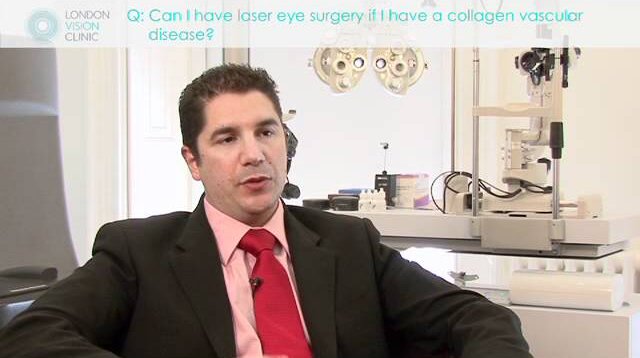Can I Have Laser Eye Surgery If I Have a Collagen Vascular Disease?

Laser Eye Surgery is an area of medicine that is constantly developing and evolving. Advancements in technology and our understanding in this area have consistently helped to make the procedure accessible to more people – including many who may previously have been unsuitable. This often extends to those with existing health conditions; but what about if you have a collagen vascular disease?
What is Collagen Vascular Disease?
Collagen vascular disease (CVD) refers to a group of conditions that cause chronic inflammation in the connective tissues. These may also be referred to as connective tissue disorders/diseases (CTDs). The connective tissues are the tissues that hold your bones, muscles and ligaments together; they provide support for organs and the body as well as store fat, protect against disease and help repair tissue damage.
Collagen is one type of connective tissue. It provides structure for your skin, bones, and joints. In collagen vascular diseases, the immune system mistakenly targets healthy tissues, causing inflammation. This can result in a number of complications and symptoms.
Many collagen vascular diseases are autoimmune diseases, including:
- Ankylosing spondylitis
- Lupus (systemic lupus erythematosus)
- Rheumatoid arthritis
- Scleroderma
- Sjögren syndrome
- Temporal arteritis
Some CVDs may be genetic. This can include Ehlers-Danlos syndrome, Marfan syndrome, and Osteogenesis imperfecta. It is also possible to have symptoms of multiple types of CVDs – this is known as mixed collagen vascular disease.
Do collagen vascular diseases affect the eyes?
While many effects of CVDs impact the cardiopulmonary and musculoskeletal systems, many of these disorders may also affect the eyes and precede the onset of other extraocular features. For example, lupus (systemic lupus erythematosus) is often associated with ocular symptoms such as dry eyes, blood vessel changes in the retina, and nerve damage.
In Rheumatoid Arthritis, a chronic autoimmune CTD affecting primarily the joints, ocular manifestations can also include dry eye disease, and less commonly inflammation of the white outer layer of the eyes (episcleritis and scleritis).
Collagen Vascular Disease and Laser Eye Surgery
A number of the ocular effects of some collagen vascular and connective tissue diseases have the potential to affect a patient’s suitability for Laser Eye Surgery. In particular, dry eye disease – depending on cause and severity – can be a reason for patients to be turned away at some clinics.
Furthermore, patients with some collagen vascular diseases are also more likely to have thinner corneas – another factor that could affect your suitability. However, as expert Laser Eye Surgeon, Mr. Glenn Carp explains in the video below, this is not always the case.

If a patient’s collagen vascular disease of connective tissue disease is not well-controlled, they may be found to be unsuitable for Laser Eye Surgery – at least temporarily. However, we work very closely with patients’ GPs and, if necessary, an ocular inflammatory expert to ensure we are able to ascertain whether you may still be a good candidate for treatment. It is essential that you inform us if you have a CVD at your initial screening appointment so we are able to make an accurate assessment.
So, to sum up: Having a collagen vascular disease doesn’t necessarily mean you won’t be suitable for Laser Eye Surgery. The only way to find out for sure is to book a consultation
For more information on suitability for Laser Eye Surgery, get in touch with one of our friendly clinic coordinators. Alternatively, Book a Consultation today to find out more.


